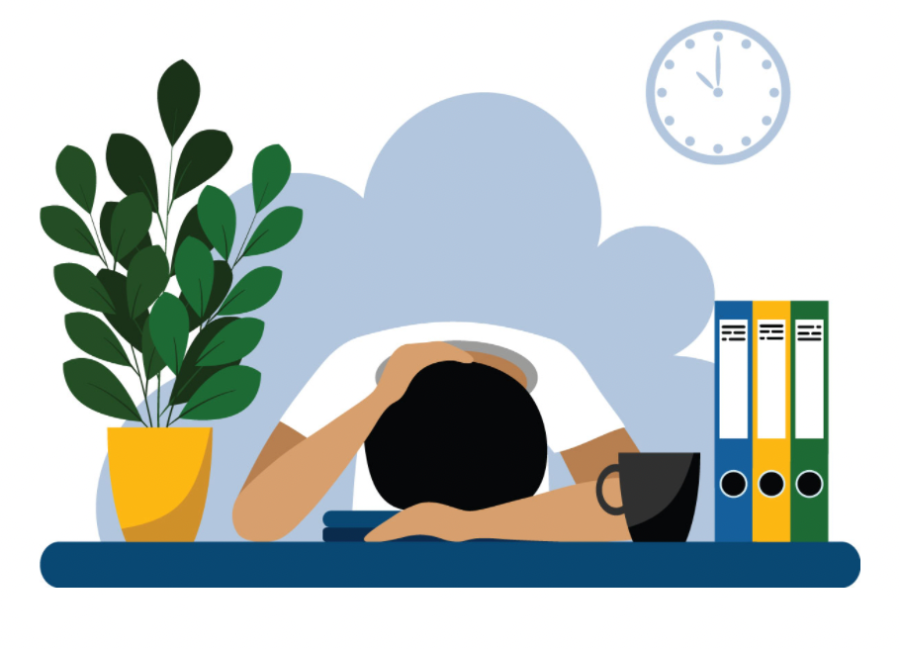Motivation: Struggling in Spring
January 17, 2022
“You can do anything, but not everything” – David Allen.
As students return from winter break, the refreshing air of incoming spring renews a motivation for academic and athletic performance. Without a doubt, a long, well-deserved break enables students to jump back into the groove after a grueling finals week. However, as the second semester progresses, motivation levels plummet as students barely have motivation to make it until spring break.
The Backing Behind Motivation
Motivation manifests in multiple forms depending on a student’s internal and external factors. For example, an academically driven student may feel more inclined to study for an exam when feeling physically well; contrastingly, the same student suffering an illness such as the common flu may encounter a decrease in grades solely based on health. In a recent Harvard study, researchers discovered that motivated students tend to rate their overall happiness higher, correlating happiness levels to motivation. On that account, emotional obstacles decrease thousands of students’ mental well-being and consequently affect their academic performance. Additionally, self-esteem tremendously influences how a student may perform. In the same Harvard study, students that received less praise from professors tend to underperform compared to their highly praised peers. Indeed, students’ emotional, physical, and mental health accounts for their academic performance and motivation levels. However, the reasoning behind motivation itself varies by definition as students set their personal goals.
The Facts
COVID-19 has dramatically impacted millions of students’ motivation levels. With online schooling, the days tend to feel longer as students are constantly home; overtime, students lose grip on their academic groove. Additionally, with some districts having school take place for a staggering, long four to five months before an ideal break, students feel a sense of dread, causing onset burnout before the school year ends. Without longer breaks, students lose motivation faster. As a result, finals weeks appear more stressful as the will to trudge onward falters. In a survey conducted by Fierce Education, teachers asked students the reasoning behind failing classes. The results show:
- 79% of students said staying motivated was the problem
- 54% of students said balancing home and family problems
- 45% of students feeling unwell emotionally
Evidently, motivation remained one of the highest reasons behind academic failure. With absolute certainty, it’s clear that school intitates a chain reaction and indirectly could cause failing grades for students. With no long, restful breaks for students, they lose their drive to complete meaningful work, which damages their GPA.

Real Students, Real Talk
In a huge, academically driven high school such as Chatfield Senior High, it’s only normal for parents to wonder whether their children face a motivation crisis among the millions of students nationwide. I took a deeper look and conducted an interview between two Chatfield Senior High Students:
- Do you feel unmotivated at the moment with the spring semester starting?
- “A little bit, but I almost feel like I felt less unmotivated last semester, especially towards the end. Since it is at the start of a new semester, I feel more motivated. However, I feel like that will change soon. I am in the middle at the moment, in any case,” –Cori Howery
- “No, I feel pretty motivated at the moment since it is a fresh start. I’m staying on top of everything. I’m sure it will change, but at the moment, I am good,” –Chloe Metz
- Why do you think you feel unmotivated?
- “It is usually because it’s hard to manage my time, and I get burnt out quickly. It is hard to find a balance between working too long without a break and taking a break and feeling bad about taking the break. But, if I find a balance, I think I would be more motivated. Also, my workload gets a lot, which feels overwhelming. It is hard to find motivation in things you are not interested in with an extreme workload,” –Cori Howery
- “Motivation is an internal force that you have to drive yourself to keep it going. There is pressure to be motivated, but to continue to be motivated, you have to do certain things all the time to keep motivated. I think it is because it’s a stereotype or pressure that you have to be motivated and not take breaks. But you have to relax and rest in order to be motivated. There is an essential balance between breaks and motivation, and there is this Goldilocks motivation that’s so hard to achieve, but many people try to get there,” –Chloe Metz
- Do you feel more motivated in the 1st or second semester? Why?
- “I think I feel more motivated at the beginning of each, but not more than another because there is a break. However, in the middle and end, I get burnt out and unmotivated by both,” –Cori Howery
- “I think I feel more motivated at the beginning of each semester. Like, I think that motivation comes in waves, and it’s dependent on outside factors that are too hard to determine, whether it’s one semester or another,” –Chloe Metz
- What motivates you to do well in school?
- “I guess getting good grades. Besides that, it’s more for me because I want to do well and not disappoint myself. Yeah. That is it,” –Cori Howery
- “Intrinsic motivation of wanting to do well to make my parents happy and myself happy. To have a good career longterm. I guess the outside stuff is that if I like the course more, I will do it more, or if it’s easier, I will do it more,” –Chloe Metz
The Solution
Despite the negative connotations, there are many ways students can combat sluggishness as the spring semester continues. Thoughtco recommends that students exercise regularly, set attainable short and long term goals, incorporate some form of creativity into their hobbies, find new places to study, and incorporate approximately an hour or two before bed for downtime rest. In addition, students can minimally alter their routine every once in a while, leading to a more sustainable, practical, and daily schedule. Overall, minor changes and practicing open mindfulness could lead a long way.
Motivation is one of the major, trending concepts that society tends to overemphasize or underestimate; hence, maintaining a healthy, realistic balance of productivity and rest proves an overwhelming challenge for many people. As the spring semester continues onward, students may continuously face a reapeating obstacle: maintaining the same drive for school till summer break arrives. It’s important for students to acknowledge their lack of motivation and recharge.
It may be difficult to find your groove again, but hang in there, Chargers, and keep on Chargin’.













